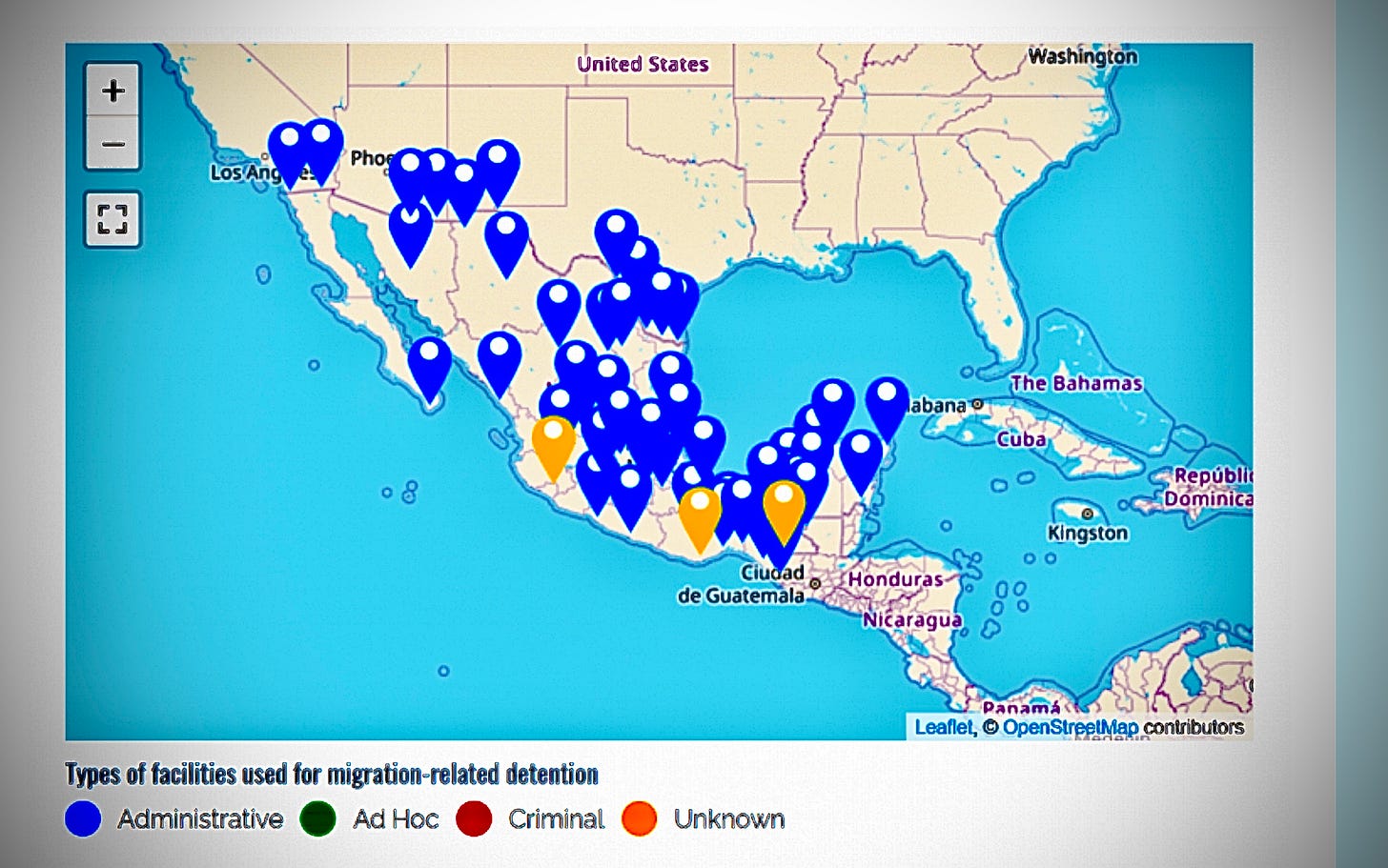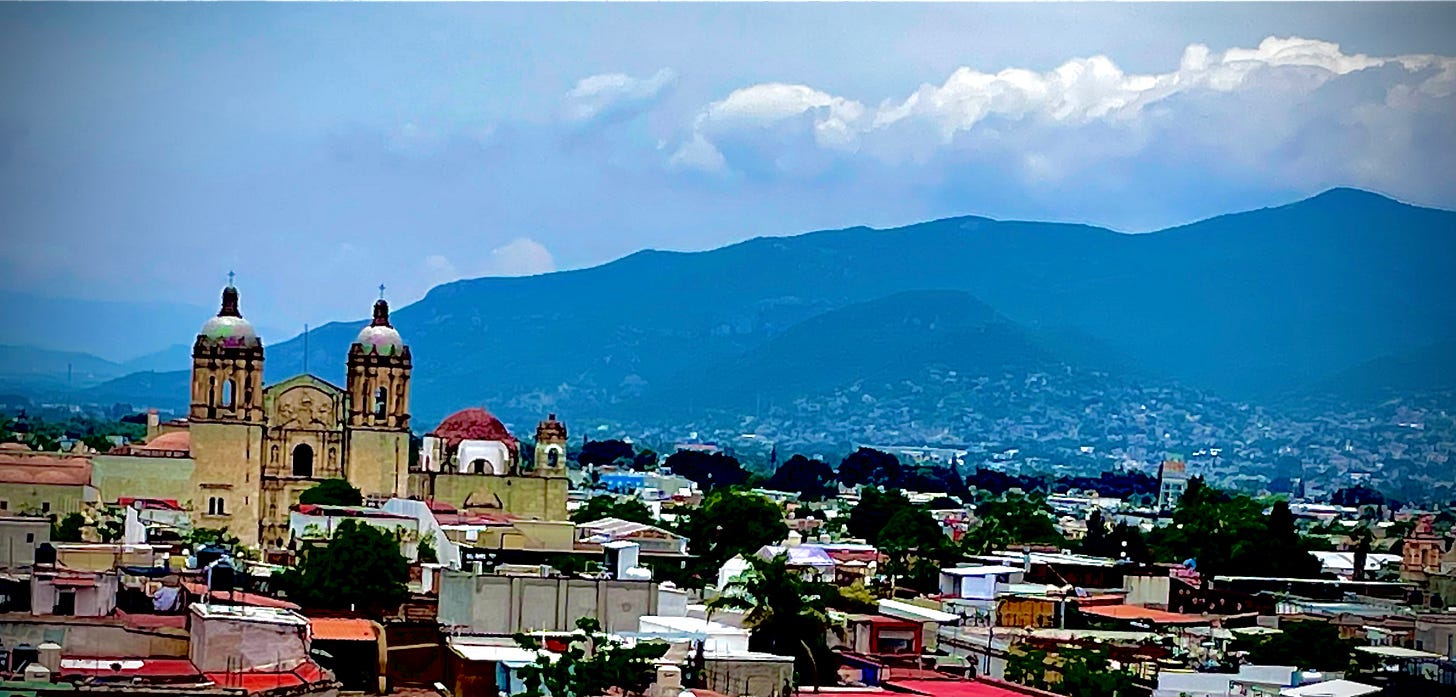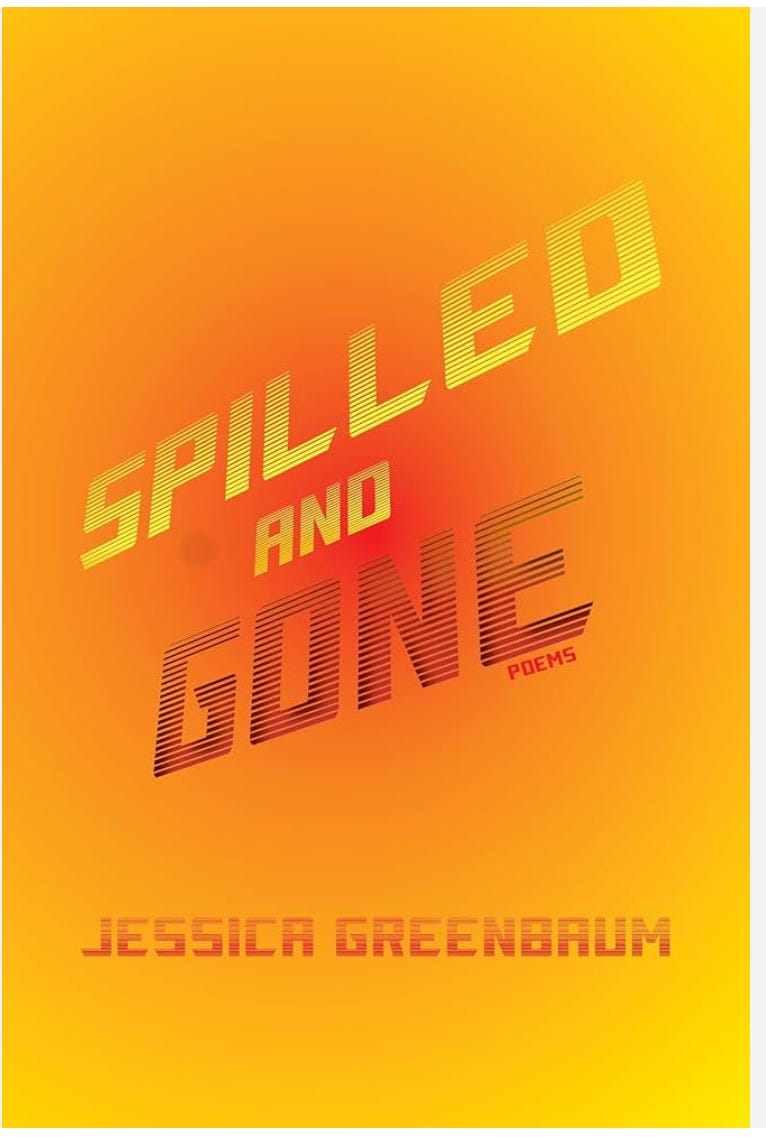Deport the Gringos? Why Not?
And poetry from Jessica Greenbaum!
Mexico takes illegal entry seriously and, with the exception of its northern neighbors, will detain those who are in the country illegally, This map shows administrative and other detention centers throughout the country.
In January of this year, a number of fake news reports started circulating in Mexico regarding the party of death and Donald Trump’s tax-the-US-citizen-tariffs that would be imposed on Mexico. The reports claimed Presidenta Claudia Sheinbaum Pardo would retaliate not only with equally exorbitant tariffs on US goods imported here but that Mexico would also begin to deport illegal US citizens.
These false reports, which circulated pretty widely on social media, in Spanish and posed as genuine news, were hard to fathom. Claudia doesn’t go for big threats. She doesn’t go for announcements that would be seen as negotiating through social media and the press. She’s serious about her job and knows that quiet, thoughtful diplomacy is the answer, even to MAGA and Trump posturing and preening. Her response to Trump’s announcement this past weekend of a tariff on Mexico of 30% as of August 1 was completely in character: when asked what Mexico would do she calmly noted that Mexico had two weeks to negotiate. She’s unflappable.
The false reporting, though, led me to an interesting thought experiment. What if Claudia did decide that she’d had enough of the bullying from up north? What if the abusive treatment of Mexican citizens, legal and illegal, and of Mexican-Americans, with ties to both countries, who as citizens live and work in the US and who send money to help their families here in Mexico, what if this treatment became too much for her? What if Claudia decided she’d had enough of blatant human rights violations—the ICE attacks, the concentration camps—against her people?
There are some 1.6 million US citizens living in Mexico. It’s estimated that up to 80% of those Americans live here illegally. The number most often cited is one million. Some of those illegals are people who, like many illegals in the US, have simply overstayed their visas.
Mexican Tourist Card, which serves as the tourist visa.
Many folks who live here, though, do it illegally by gaming that tourist visa system. These US citizens enter Mexico on 180 day tourist visas. Just before the 180 days are up, their usual (and illegal) practice, is to leave the country, either go to Guatemala or to a northern US border crossing, spend a few hours or a night in the other country, and then come back for another 180 days. They then continue that every six months or so.
During the first Trump administration, and some suspect in retaliation to Trump’s huffing and puffing about the border wall (for which Mexico paid not a dime), then-President Manuel Lopez Obrador, known as AMLO, started to try and tighten up on this practice. Tourist visas weren’t automatically granted for 180 days on entry. Immigration started to more closely track tourists as they entered and left.
These are people who have lived here in Mexico for quite a while. They own homes or have long term rentals. Some of them have families and their kids go to school here. They are known members within their communities. Though some came more recently, due to COVID and the ability to work as digital nomads, most have been here much longer. Some work illegally as well.
Many live here on pensions and Social Security because living in Mexico is cheaper than living in the US. As the Mexican economy has continued to improve under AMLO and Claudia and the peso improves against the dollar, some are starting to worry because their money doesn’t go as far as it used to. They don’t necessarily see the higher standard of living for Mexicans as a good thing (I think it’s terrific). But that’s another question.
What they have in common is they are breaking Mexican law. They have avoided becoming temporary or permanent residents, even though that is how they live their lives and want to continue to live. Many of them haven’t sought residency because they can’t afford the fees. And because they’ve been able to get away with it. They have counted on Mexico’s legendary laxness at enforcing its own laws.
So imagine if Claudia begins to think, Well, I have all these illegals here. Sure, they’ve lived here a long time, are considered valued members of the community. They love it. They employ people. They pay the value added tax which is one of the main engines of our economy. But they are illegal. They’ve broken the law and they don’t belong.
Guardia Nacional on border patrol.
And with that she authorizes the elite police/military force, the Guardia Nacional created under AMLO, to start rounding up gringos. The Guardia Nacional begins to seek out people who look Caucasian, who speak English. They target places where gringos are usually found: English language libraries, neighborhoods in certain cities, certain businesses. They might target parents picking their kids up from school. And take the parents, leaving the children to fend for themselves.
When the Guardia Nacional comes after people, masked and without warrants, carrying high-powered weapons, they don’t care if the people actually are legal residents. Or even if, like me, they happen to be citizens. It isn’t our documents that count. It’s the color of our skin, the language we happen to speak at that moment.
They start putting those US citizens in detention camps. Claudia authorizes the Fuerza Aérea to send them away, perhaps to the country of their origins, perhaps to third party countries. She puts some on buses for Guatemala. Honduras. El Salvador. And yes, she even sends some of those buses to the US and just dumps those US citizens there. No papers. No possessions. No family. Vaya con Dios.
What would be the reaction in the US to one million US citizens being treated this way? How would the death party and its MAGA lemmings respond? Would they welcome the US. citizens back, the way Mexico has actively welcomed back its deported from the US citizens? Would their dear leader coordinate government services with private business to create jobs for them, make sure they had places to live? That’s what the Mexican government is doing with the Mexican citizens now being put in camps before being thrown out of the US.
I imagine the outrage. How dare US citizens, who have broken Mexican laws, have repeatedly flaunted their gaming of the system, be treated this way? Doesn’t Mexico have due process? These are people with families, with homes!
Imagine it. Mexico acting as if its gringo population didn’t belong. Treating all of its gringos like the criminals some of them are? Targeted because of the color of their skin, the language they speak?
While ICE Barbie Noem and Texas state officials claimed that they and FEMA acted as quickly as possible, numerous reports showed that because of budget cuts, FEMA was slow to respond to the tragic (and predictable) flooding of the Guadalupe River. Fortunately Mexico was able to immediately send trained workers, including trained dogs, to assist in the rescue of flood victims.
Imagine.
Of course, it isn’t happening and I doubt it ever will. My illegal gringo friends here can rest easily. Claudia has no intention of behaving like her wannabe-authoritarian-descending-into-dementia counterpart in the US.
We’re civilized here. Something the death party never has been and never will be.
Civilized.
Some Poetry:
This week’s featured poet is the remarkable Jessica Greenbaum. Jess was at Barnard when I was at Columbia—she even studied for a year with Kenneth (Koch)! Oddly enough, though we knew many of the same people, we didn’t know each other. I did know of her, her poetry even then was impressive. In recent years, going back to ten or so before we made the move down here, both of us New Yorkers, we were finally in touch. Neither of us is certain, but we think it was Jeff Harrison, who was one of those mutual undergraduate friends (and who will be a featured poet in the coming weeks for Poet in Mexico), who finally put us in touch with each other. Jess was down here recently with her husband Jed Marcus, and we had a terrific time one afternoon/evening, at Cafe Boca del Monte (the views are extraordinary), catching up, talk talk talk.
An afternoon rainy season view of Oaxaca, with Santo Domingo Church, from Cafe Boca del Monte, July 2025.
Jess is a poet of moving intimacy and of familiar spaces. The life she writes about is one that contains worlds I don’t necessarily know yet, through her voice, her sense of line and language, becomes immediately present for me. It moves me greatly.
Her work has appeared in a number of terrific places, from Poetry and The New Yorker to the Journal of the American Medical Association. Several of her books have won significant awards. Her most recent, Spilled and Gone is, I think, my favorite.
It’s a great pleasure to present my friend , Jessica Greenbaum, as one of the Poets in Mexico.
Towards the End of My Mother’s Life which I pictured as her nearing the edge of a large open plain uncontained wind spun at her hair even as I brushed it; speaking to her was like calling with a hand cupped beside my mouth because she was slightly estranged from language and sat wild-eyed in the swirl of any conversation. I understood this; from where my own daughters stood— so buddy-buddy with the current world— much needed explaining to the one who used to explain. Maybe aging can be measured in units of explanation— how much you have left—and I still had small bills, you know information about tasks of daily administration— but no longer how the hummingbird tamps spider webs to make a nest or an octopus turns any color in the ocean. I even remember with joy my youngest, home with a fever— how we read a picture book about The Endurance to cool her off and, as she recovered how she found to her delight she could stack one large number on top of another to add up perfectly below a line she drew. That was life and as my mother nears the rim of hers and the wind has stripped away the thin sheaf of her living anger— her competition with happiness itself— now her bare bowed shoulders of kindness frighten me, pain me she who has loved me so dearly without my knowing. And how to explain what adds up and endures in this life? From Plume Department Store Escalator --After Szymborska’s “Puddle” I remember that childhood fear well. If I stepped on the down escalator which bowed outward over thin air between floors to a destination I couldn’t see at my height and, sadly, would never reach the moving teeth would casually drop me into space as it had almost done each time before while mannikins stood blank-faced in their checked raincoats a clerk fussed with a clothes rack gay shoppers passed me rising, looking upward, without a care this time no different: the tug of my mother’s hand again, the most shocking. From, Alaska Quarterly Review Towards the End of My Dad’s Life We Go Back to Arguing, and Soon After He Dies, I Break My Elbow —but I prefer not to disentangle it, because it is more accurate. --Tony Hoagland “Entangle” Bone chips of circumstance —not the whole frame or heart of us--took on the well-timed task to fracture and distract—instead of name— that those five days in hospice were his last. Despite more perfect decades where I feared his death for months, more recent arguments clashed with our heyday’s scenes (like when you hear inside the theater, sirens from the street—) which helped defray the grief, a complement that countered all the peace. We’re more complete like this, the way toy model skeletons work only if the smallest joints stay put. Lost cog? He’d blame me first when I was young though misplaced parts were rarely lost for good. From JAMA: Journal of the American Medical Association Ode to Doubt Cowlick of the combed thought, Today I praise your interruption of the smooth plan, Your distracted hum beneath the selected hymn. Without you our drama is delivered in soliloquy, Our travels, a clear path from A to Z— No swaying, or doubling back, no veering Into the overgrown’s allures. We once dreamed of such direction! And we once craved clear instruction! But these decades on, your course- Correction, your static-filled obfuscation of a first message Goes up against the royalty of right and wrong Like a court dissident with subversive charms Just come to town. I have seen your work Up close; it built my house and paved my road to it. I think you line the bridal gown And are the seashell’s second thought. Not only would the manufacturers of pencil erasers Lose their livelihood, but the raison d’état Of p.s. and codas, of cancellations and The low, late in the day bow to intuition Would be lost in the homogeneity ruling the Lock-step blue prints of our worst architecture. Ambivalence, wrongly typecast as villain May be seen as blind justice holding scales, Interrupting decision and asking for more time. We need more time. If not hunted by Pythons or big cats, we need More time, the split-second decision Can be split again, as the rock with layers Spills its colored minerals. We will Rarely know if the first thought Was best. That living mystery is why the Day turns. Said to be a planted seed I think you are also the shade of the age-old tree Under which we sit, against whose Scratchy bark I lean, and bitten by an ant Of doubt, think again, about these very lines. Forthcoming North American Review
Jess and Jed at Hierve el Agua, Oaxaca, 2025.
Good Links: Jessica Greenbaum and Immigration Songs
Jessica Greenbaum info:
To learn more about Jess and the work she does, as a teacher, as a poet, and more about her books and other publications, her website is here: https://poemsincommunity.org. As usual, I encourage you to go to your local independent bookstore and ask (or demand?) that they order her books for you. Support independent booksellers!
Outernational, featuring Residente, Tom Morello, Chad Smith, Todos Somos Illegales (2012):
Jesus Mendez and Los de la Norte, Inmigrantes Unidos (2024):
The Pogues, Thousands are Sailing (1988):
A reminder about what it means to need to sail, about lands of opportunity. What the US was. What other countries are becoming.











Mark,
Very interesting thoughts about the reversal of illegal immigration situations.
It seems to me that many Gringos come to México to enjoy a less expensive life while Mexicans go north to work to improve their lives.
Fortunately, Claudia keeps a cool head about it
A little language/culture note (this surprised me): In Portugal--where I'm currently (legally) visiting--the word "gringo" is understood to refer to any "foreigner," not just a Norte Americano.